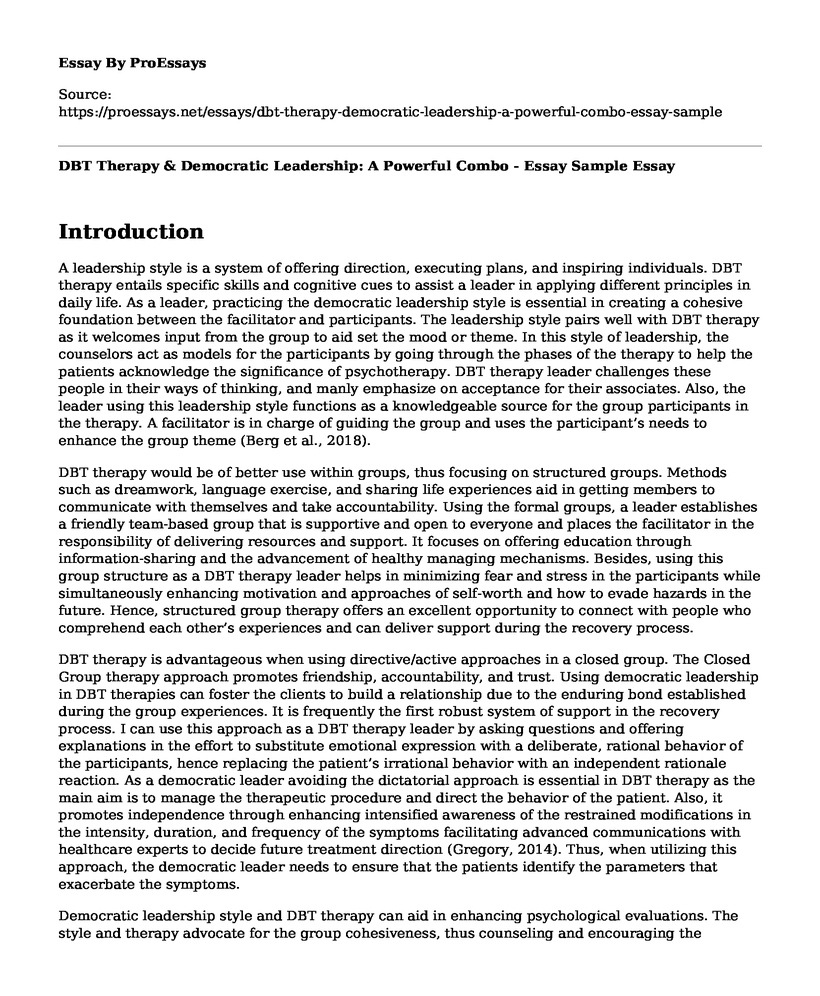Introduction
A leadership style is a system of offering direction, executing plans, and inspiring individuals. DBT therapy entails specific skills and cognitive cues to assist a leader in applying different principles in daily life. As a leader, practicing the democratic leadership style is essential in creating a cohesive foundation between the facilitator and participants. The leadership style pairs well with DBT therapy as it welcomes input from the group to aid set the mood or theme. In this style of leadership, the counselors act as models for the participants by going through the phases of the therapy to help the patients acknowledge the significance of psychotherapy. DBT therapy leader challenges these people in their ways of thinking, and manly emphasize on acceptance for their associates. Also, the leader using this leadership style functions as a knowledgeable source for the group participants in the therapy. A facilitator is in charge of guiding the group and uses the participant’s needs to enhance the group theme (Berg et al., 2018).
DBT therapy would be of better use within groups, thus focusing on structured groups. Methods such as dreamwork, language exercise, and sharing life experiences aid in getting members to communicate with themselves and take accountability. Using the formal groups, a leader establishes a friendly team-based group that is supportive and open to everyone and places the facilitator in the responsibility of delivering resources and support. It focuses on offering education through information-sharing and the advancement of healthy managing mechanisms. Besides, using this group structure as a DBT therapy leader helps in minimizing fear and stress in the participants while simultaneously enhancing motivation and approaches of self-worth and how to evade hazards in the future. Hence, structured group therapy offers an excellent opportunity to connect with people who comprehend each other’s experiences and can deliver support during the recovery process.
DBT therapy is advantageous when using directive/active approaches in a closed group. The Closed Group therapy approach promotes friendship, accountability, and trust. Using democratic leadership in DBT therapies can foster the clients to build a relationship due to the enduring bond established during the group experiences. It is frequently the first robust system of support in the recovery process. I can use this approach as a DBT therapy leader by asking questions and offering explanations in the effort to substitute emotional expression with a deliberate, rational behavior of the participants, hence replacing the patient’s irrational behavior with an independent rationale reaction. As a democratic leader avoiding the dictatorial approach is essential in DBT therapy as the main aim is to manage the therapeutic procedure and direct the behavior of the patient. Also, it promotes independence through enhancing intensified awareness of the restrained modifications in the intensity, duration, and frequency of the symptoms facilitating advanced communications with healthcare experts to decide future treatment direction (Gregory, 2014). Thus, when utilizing this approach, the democratic leader needs to ensure that the patients identify the parameters that exacerbate the symptoms.
Democratic leadership style and DBT therapy can aid in enhancing psychological evaluations. The style and therapy advocate for the group cohesiveness, thus counseling and encouraging the provision of support, recommendations, assurance, and perceptions of group members (Berg et al., 2018). With democratic style and DBT therapy, the facilitator assists in identifying common themes. Cooperating with group members will aid the patients in concentrating less on their challenges to help the other people in the group, thus feeling connected and more capable of studying and comprehending other’s concerns.
References
Berg, R. C., Landreth, G. L., & Fall, K. A. (2018). Group counseling: Concepts and procedures (6th ed). New York, NY: Routledge.
Gregory, M. R. (2014). The procedurally directive approach to teaching controversial issues. https://doi.org/10.1111/edth.12087.
Cite this page
DBT Therapy & Democratic Leadership: A Powerful Combo - Essay Sample. (2023, Aug 28). Retrieved from https://proessays.net/essays/dbt-therapy-democratic-leadership-a-powerful-combo-essay-sample
If you are the original author of this essay and no longer wish to have it published on the ProEssays website, please click below to request its removal:
- Glencore Plc Organizational Operational Objectives - Essay Example
- Assignment Example on Leadership and Management
- How Does Interest Groups Influence the Policy-Making Process Essay
- Essay on Continuum Change in Corporate Philosophies
- Decision-Making in a Role of a Manager Paper Example
- Business Consulting Industry Paper Example
- Managing the Supply Chain Paper Example







